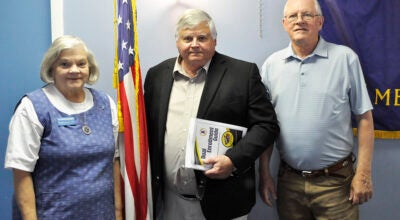Officials: Highway rally would not be legal
Published 3:00 am Wednesday, January 17, 2018
A proposed protest on U.S. Highway 231 would not be legal, according to officials with the Alabama Department of Transportation.
Organizers have said they will block the highway on Feb. 5 if City of Troy officials do not provide answers – specifically body cam footage – relating to the use of force during the arrest of a teenager in December 2017.
Rally organizer Kenneth Glasgow said lawyers are looking into the legal ramifications of blocking the highway and that he couldn’t speak for what he or other protestors would do if they determine the protest would not be legal.
“I think that everybody is aware about the legal parameters,” said Kenneth Glasgow, protest organizers. “I think people are ready for civil disobedience; they’re just ready for the truth. But I can’t speak for everybody else.”
Protestors are seeking answers in the alleged beating of Ulysses Wilkerson III at the hands of a Troy Police officer during an arrest. The officer has been placed on administrative leave and the State Bureau of Investigations is conducting an independent investigation into the incident. Glasgow, who has previously served as a spokesperson for the Wilkerson family, called for the U.S. 231 rally as a response to the lack of information provided to the family.
However, state officials said this week that any protest blocking the federal highway could expose protestors to criminal charges.
ALDOT spokesperson Brantley Kirk said the department has no permit process for allowing groups to blocking a major federal highway. “There are times when a city asks for a portion of a state or federal highway to be blocked for a time, and those are handled on a case-by-case basis,” Kirk said.
For example, the City of Troy sometimes coordinates with the local ALDOT officials to block a portion of Three Notch Street, a part of U.S. Highway 29, for parades downtown.
Trooper Tracy Nelson said a multitude of laws could apply if protestors are blocking a road without permission, chief among them disorderly conduct, which includes a person obstructing “vehicular or pedestrian traffic, or a transportation facility … with intent to cause public inconvenience, annoyance or alarm, or recklessly creating a risk thereof.” The same section also defines disorderly conduct as failing to disperse at the order of a law enforcement officer if gathered with another person.
Other laws such as unlawful assembly and inciting to riot would not apply unless the protest became violent, which Glasgow has said the family and protestors want to avoid.
Nelson said Troy Police would have primary responsibility for handling the situation if the protest takes place within the city’s jurisdiction, but Troopers would also have authority to handle any illegal activity on the roadway.
Troy Police Chief Randall Barr did not comment before publishing time.
Glasgow said his intent is to have city officials and law enforcement release evidence and body cam footage of the incident to the family prior to Feb. 5.
“Nobody wants to block a road,” Glasgow said. “We’re just hoping they give the family their answers. Why won’t these folks tell the truth? They’ve got video, they’ve got evidence; show it to the parents. We’re giving the city and SBI ample enough time to do something.”
Troy Mayor Jason Reeves handed the investigation of the incident to the State Bureau of Investigation (SBI) on Dec. 24 less than 24 hours after the incident occurred.
After SBI officials met with the family on Friday, Jan. 12, SBI officer Gregory Carpenter said the bureau doesn’t release evidence during ongoing investigations.
“It is understandable for members of the family and other concerned citizens to have questions,” Carpenter said. “It is SBI’s responsibility to collect, report and communicate all related facts in a properly legal manner so that the criminal justice system is best equipped to render a finding. SBI does not condone any premature releases of information that could jeopardize the rights of all involved parties and/or undermine the course of justice.”





